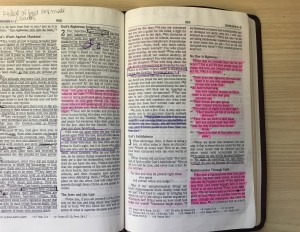
The Bible I received in my early adolescence sits on my desk. I often use it as a point of reference when I need to quickly look up a verse or two. Recently, I opened it up to Romans for some extra context for my daily devotional, but instead of a closer look into Paul’s letter I got a look into the Christian I was between the ages of 12 and 18. Reading the notes I wrote and the verses I highlighted years ago was much like going through an old photo album and finding your most awkward junior high school portrait. I was mortified!
I was raised in a church where grace was the thing that happened if God forgave you of the bad things you did, but they warned us not to sin too much, lest the grace stop. When I saw a childishly scribbled note in my Bible that read, “Rules of God are made clearly,” followed by highlights of verses that reinforced my legalistic view of Christianity, I was embarrassed. I had these flashbacks to my childhood where I would pray for salvation over and over, just in case I didn’t mean it enough the first time. I remember condemning words spewing out of my mouth—words that I had no authority to speak.
In my small-minded understanding of the Bible, there was no room for doubt and no room in Heaven for those who couldn’t follow the rules. This, of course, led to crippling guilt when I struggled with my own sin.
It wasn’t until college that I finally understood the meaning of God’s perfect grace. When the lightbulb turned on in my head, there were subtle changes in my own heart that subsequently changed the ways I lived out my faith. One of the most noticeable changes was I was no longer crippled by guilt. It wasn’t that I suddenly stopped sinning, but when I found myself falling short, I leaned more on God’s righteousness and began striving to align my will with his.
This is the difference, I think, between guilt and accountability, condemnation and conviction. Guilt and condemnation plunges us into a frame of thinking that tricks us into believing that God will never accept us as we are. Accountability and conviction urge us to repent and yearn for a life that is fully bound by salvation offered through faith in Christ. Now, looking back on the notes I wrote and the verses I highlighted in Romans, I’m able to laugh at how much I mistook Paul’s exhortation for accusation and God’s wrath for his mercy.
Join us this summer as we read through Paul’s Epistles on our Scripture + Shared app! You can access download the app or access the materials here.

Leave A Comment